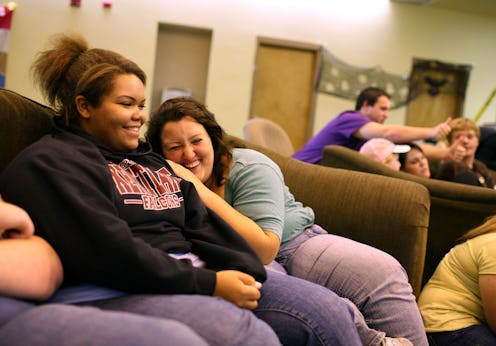Life
Back to School: Study "Feminism and Technology"
Feminist professors all over the world are gearing up to teach a "Dialogues on Feminism and Technology" course this fall. They're all teaching the same course to the same students — well, sort of. It's an open collaborative course, similar to the MOOCs you might have been hearing about, but this one is designed to be more individualized, more student-centered, and much more in line with feminist pedagogy.
MOOCs, or massive online courses, are relatively new, free online courses often organized by for-profit institutions. This "Dialogues on Feminism and Technology" course, however, is considered a DOCC (distributed open collaborative course). Ann Balsamo, co facilitator of the course and assistant dean at The New School, told Inside Higher Ed:
"A DOCC is different from a MOOC in that it doesn't deliver a centralized singular syllabus to all the participants. Rather it organizes around a central topic. It recognizes that, based on deep feminist pedagogical commitments, expertise is distributed throughout all the participants in a learning activity."
"Dialogues on Feminism and Technology" aims to take the great aspects of MOOCs, like video content and collaboration, and implement them into a more sustainable learning strategy. For example, unlike a MOOC, this DOCC course will be run concurrently at universities all over the world, including ones in the United States, Australia, and Canada. Each week will have a similar theme and similar assignments, but classes will be instructed by individual professors will will modify and personalize course content for their own students. Each class will be between 15 and 30 students and will be for credit. The goal is to produce large amounts of video content (weekly videos that will be used to provide historical context to each week's topic) that can be used in physical classrooms during the course, but will also be available to anyone.
MOOCs have only existed for a few years, but they're already controversial in the world of higher ed; they're often useless in terms of credit and their learning efficacy is highly debatable. The organizers behind the "Dialogues on Feminism And Technology" DOCC say their class pushes against the idea that MOOCs are taught by the "best" professors, as well. Ann Balsamo said,
"The idea of the one best talking head, the best expert in the world, that couldn't be more patriarchal. That displays a hubris that is unthinkable from a feminist perspective."
It seems like there couldn't be a better course than "Dialogues on Feminism and Technology" on which to test out this new model of online learning. Alexandra Juhasz, a media studies professor at Pitzer College who is also co-facilitating the course, said:
"Our DOCC is built to value situated experience and emphasis, and to share authority and responsibility rather than the MOOC's top-down, one size fits all, sometimes elitist approach...While these structures mirror my own feminist values and approaches, I imagine that most educators will be intrigued by this more democratic and responsive model for technology enhanced learning."
One thing every course at each of the 16 colleges and universities offering "Dialogues on Feminism and Technology" will have in common is "Storming Wikipedia," in which students will be given lists of important female contributors to the worlds of science and technology and required to add or revise their Wikipedia entries. Around 90 percent of Wikipedia editors are men.
I graduated from college seven years ago and from graduate school two years ago, but damn, if I wouldn't absolutely love to take this course. It's interesting, innovative and in line with feminist principles — what's not to love?! Those who are not enrolled at any of the 16 participating schools can still learn as drop-in students. Learn more about the course at FemTechCommons and, like me, get excited.
